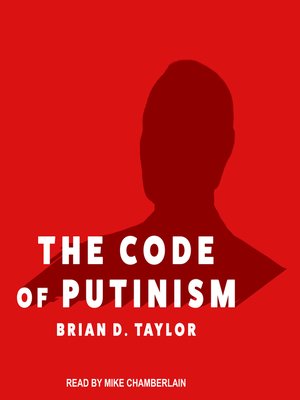
Sign up to save your library
With an OverDrive account, you can save your favorite libraries for at-a-glance information about availability. Find out more about OverDrive accounts.
Find this title in Libby, the library reading app by OverDrive.



Search for a digital library with this title
Title found at these libraries:
| Library Name | Distance |
|---|---|
| Loading... |
What is Vladimir Putin up to? This book shows how the mentality of Putin and his team—the code of Putinism—has shaped Russian politics over the past two decades. It explains not only the thoughts and ideas that motivate Putin's decisions, but also the set of emotions and habits that influence how Putin and his close allies view the world.
Taylor draws on a large number of interviews, the speeches of Putin and other top officials, and the Russian media to analyze the mentality of Team Putin. Key features of Russian politics today—such as authoritarianism, Putin's reliance on a small group of loyal friends and associates, state domination of the economy, and an assertive foreign policy—are traced to the code of Putinism. Key ideas of the code include conservatism, anti-Americanism, and the importance of a state that is powerful both at home and abroad. Dominant habits of Putin and his associates include control, order, and loyalty. Important feelings driving Russia's rulers include the need for respect, resentment about lost status and mistreatment by the West, and vulnerability.
While some observers portray Putin as either a cold-blooded pragmatist or a strident Russian nationalist, Taylor provides a more nuanced and compelling interpretation of Putin's motives and actions.
Taylor draws on a large number of interviews, the speeches of Putin and other top officials, and the Russian media to analyze the mentality of Team Putin. Key features of Russian politics today—such as authoritarianism, Putin's reliance on a small group of loyal friends and associates, state domination of the economy, and an assertive foreign policy—are traced to the code of Putinism. Key ideas of the code include conservatism, anti-Americanism, and the importance of a state that is powerful both at home and abroad. Dominant habits of Putin and his associates include control, order, and loyalty. Important feelings driving Russia's rulers include the need for respect, resentment about lost status and mistreatment by the West, and vulnerability.
While some observers portray Putin as either a cold-blooded pragmatist or a strident Russian nationalist, Taylor provides a more nuanced and compelling interpretation of Putin's motives and actions.







